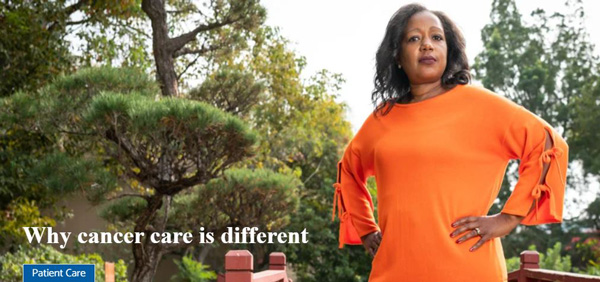By City of Hope | February 04, 2021
Why Cancer Care is Different
Kommah McDowell was just 29 when she found a painful mass in her right breast. For seven months in 2005, her primary care physician repeatedly reassured her that she was too young to have cancer.
That doctor was wrong. Without proper diagnostic testing, McDowell had lost precious time in her fight with breast cancer. Worse yet, her doctor lacked the expertise to put together a treatment plan.
McDowell sought a second opinion from City of Hope, where specialists diagnosed her with two particularly rare and aggressive forms of breast cancer, and set up a strategy that included chemotherapy, radiation and surgery.
It was a difficult road, but that second opinion saved McDowell’s life. Fifteen years after her diagnosis, she is free of cancer and living happily with her husband, whom she had married between chemo appointments, and her son, born three years after her final radiation treatment.
Cancer Is Different
Providing health care for cancer is different than for any other disease. Cancer is now recognized not as one condition, but as multiple conditions. With the emergence of genomic sequencing technology, cancer may soon be viewed as potentially hundreds of conditions. In the near future, it is likely that cancer diagnoses will be characterized as much by distinct genetic mutations as by their site of origin (breast, prostate, lung, etc.). That means that cancer is a highly personal disease that differs from individual to individual.
However, hospitals and physician groups have widely varying levels of experience in diagnosing and treating the various types of cancer, much less how those types may manifest uniquely in individuals. Community oncologists can see up to 30 patients in a day, each with a different kind of cancer. It is simply impossible to keep up with the pace of innovation across the entire cancer care spectrum.
“The need for access to the proper expertise is heightened by the reality that cancer is a rapidly evolving field, one that requires ongoing access to the most recent therapeutics and technology. The consequences of limited or delayed access to state-of-the-art diagnostics are significant, leading to misdiagnoses that can often mean unnecessary exposure to toxic chemotherapy agents, suffering or avoidable death,” said Joseph Alvarnas, M.D., a hematologist-oncologist who serves as vice president of government affairs and senior medical director for employer strategy at City of Hope.
Approximately 187,140 Californians are diagnosed with cancer annually. Each year, thousands of these new cancer patients are misdiagnosed or placed on treatment regimens that are inappropriate or ineffective for their condition.
Complex cancers are best treated by specialists who have experience in treating patients with that type of cancer — not a general oncologist who treats multiple cancer types. It is an oft-repeated truism among oncologists that the best chance of a cure is the first chance of a cure. Cancer survival uniquely relies on the accuracy of the initial diagnosis, the choice of therapy and access to appropriate clinical trials. Yet, a recent report found that narrow health insurance networks are more likely to exclude oncologists affiliated with National Cancer Institute-designated comprehensive cancer centers, where the latest innovations and therapeutics are developed. These limited physician networks create barriers for cancer patients in obtaining specialized, potentially lifesaving care in a timely manner.
The NCI Comprehensive Cancer Centers Program was created as part of the National Cancer Act of 1971. Through this program, the NCI recognizes centers around the country that meet rigorous standards for transdisciplinary, state-of-the-art research focused on developing new and better approaches to preventing, diagnosing and treating cancer. According to the NCI, “The cancer centers develop and translate scientific knowledge from promising laboratory discoveries into new treatments for cancer patients. The centers serve their local communities with programs and services tailored to their unique needs and populations.” Currently only 51 such centers have been designated across the country. City of Hope is one of them.
Expertise Matters
In cancer care, expertise matters. Next-generation genome sequencing, adoptive immunotherapy, gene therapy and precision medicine are moving us away from the historic “one-size-fits-all” approach to treating diseases.
Narrow networks assume that for each cancer patient, the needed expertise is ubiquitous. This may be the case for some common, early-stage cancers. But, for other rare or complex cancers, such as acute leukemia or other blood cancers that require highly specialized interventions, a limited network may deny a patient access to the care or expertise available at a comprehensive cancer center. Many of these patients lose their lives or live a shorter lifetime of chronic illness, pain and suffering. When it comes to cancer survival, access to specialists may be everything.
Access To Research Helps Patients
Cancer is an evolving field, one that requires ongoing research and access to the most recent data and technology. Many times, the best treatment choice for a cancer patient is a clinical trial that is offered in limited locations. When it comes to rare and complex cancers, patients need and deserve immediate access to providers who have the track record and expertise to treat and cure diseases.
Cancer care is expensive, but mistreating patients is more expensive, particularly in human costs. When patients with rare or complex cancers have access to care at a comprehensive cancer center, they often experience better outcomes at lower costs. Research has documented significant differences in outcomes, including survival, if a patient is seen at a community hospital versus an NCI-designated comprehensive cancer center.
Patient Stories
There are countless stories of cancer patients whose health — not to mention life — trajectory took a much more hopeful turn once they were finally seen by experts at a comprehensive cancer center like City of Hope.
One notable example is Chuck Fata, who initially saw his regular doctor for back pain in 2015. His physician saw the problem as a symptom of a too-busy life. The pain got worse, and three months later, tumors showed up on a diagnostic test.
Fata’s battle with non-Hodgkin’s lymphoma was a tough one. Each time he thought his physicians had helped beat it back — with chemotherapy, then a transplant of blood stem cells, then surgery — the disease returned.
He feared he had run out of options. His doctors had one more idea, though.
Fata was referred to City of Hope. There, he received care through a clinical trial, a research study that offers patients access to innovative new treatments. In this case, the treatment was CAR T cell therapy. It involves modifying cells from a patient’s own immune system so that they’re primed to hunt down tumor cells and then returning the cells to the patient’s body.
That clinical trial saved Fata’s life. His lymphoma went into complete remission a month after treatment, and remains in remission to this day.
Another patient, Anthony Wright, suffered with an extremely painful spinal tumor for two and a half months before it was finally identified in November 2018. Thanksgiving with his wife, JoAnn, and their adult children — bedside in the hospital — brought a second blow: The cancer had actually started in his lung and spread to his back.
Working with managed care doctors, Wright went through radiation, chemotherapy and a targeted cancer drug. Nothing seemed to work, and the physicians suggested that he move to end-of-life care.
That’s not the end of his story, though. Friends and family members suggested he go to City of Hope.
Specialist Erminia Massarelli, M.D., Ph.D., M.S., refocused his treatment plan with a targeted therapy, which had shown some effect. Meanwhile, expert surgeon Mike Y. Chen, M.D., Ph.D., removed the mass from his spine in a complicated procedure — an approach that Wright’s previous doctors had refused to even try.
Soon, the pain in Wright’s back and leg faded. His lung cancer continues to shrink away thanks to the medicine. With high-quality care, he and JoAnn have regained something invaluable: time together.
The outcome for all of these patients likely would have been very different had they not had the option to pursue more specialized care from experts at an NCI-designated comprehensive cancer center or leading academic medical center. And there are scores more just like them — many who never get the same second shot at a cure.
The Cancer Patients Bill Of Rights
Because cancer is different from any other disease, posing unique challenges and requiring expertise for proper care, City of Hope and an emerging coalition of partners, including the American Cancer Society Cancer Action Network and the California Chronic Care Coalition, are urging the California State Legislature to pass a Cancer Patients Bill of Rights authored by state Sen. Susan Rubio. Included in the bill is that cancer patients have the right to timely access to a cancer subspecialist who has expertise in the treatment of their subtype of cancer; they have the right to direct access to a National Cancer Institute-designated comprehensive cancer center or a leading academic medical center for the management of complex cancers that require multiple experts or high risk or emerging therapies; and they have the right to timely access to relevant clinical trials, medical research and cutting-edge innovation, including evidence-supported precision medicine.







